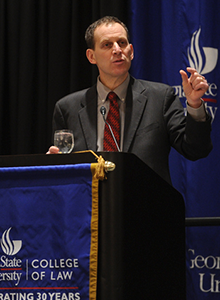Dorf Weighs Mandates, Prohibitions
"The challengers were making a libertarian argument against mandates, but to appeal to the more conservative justices, they could not invoke the right to bodily integrity under Roe v. Wade," said Michael C. Dorf, the Robert S. Stevens Professor of Law at Cornell University Law School, during the 52nd Henry J. Miller Distinguished Lecture Series on March 7. Dorf provided an analysis of the arguments and motivations in the Court's health care decision in National Federation of Independent Business v. Sebelius.
In his presentation, "Commerce, Death Panels and Broccoli: Or Why the Activity/Inactivity Distinction in the Health Care Case Was Really About the Right to Bodily Integrity," Dorf suggested a stronger argument would have been one that leveraged Roe's limitations on the government's ability to interfere with an individual's bodily integrity. However the challengers' political ideology led them to focus on the issue of congressional use of the Commerce Clause and how it relates to mandating and prohibiting certain activity.
 "Mandates are common, and not always worse than prohibitions," Dorf argued. People commonly associate mandates with restricting liberty, particularly those that "instrumentalize" people. These mandates "can have the effect of turning a person into a means by which the government achieves an end—even when it is not necessarily in the best interest of the individual," he said.
"Mandates are common, and not always worse than prohibitions," Dorf argued. People commonly associate mandates with restricting liberty, particularly those that "instrumentalize" people. These mandates "can have the effect of turning a person into a means by which the government achieves an end—even when it is not necessarily in the best interest of the individual," he said.
A key signal as to what the Court was thinking came during oral arguments in the Patient Protection and Affordable Care Act case when Justice Anthony Kennedy asked the solicitor general if there was not a heavy burden of justification on the government when a law changes the relationship of the individual to the government, Dorf said.
"Ordinarily we think of laws telling us you can't do this or that, but not obligating us to anything," Dorf said. He cited Wooley v. Maynard (1977), in which the Court ruled that a state may not force an individual to be an instrument to enforce views he or she finds unacceptable.
However, some mandates are a part of life: mandatory vaccines, jury duty, the draft and paying taxes all instrumentalize people. So, should health care be one of them?
Dorf began his discussion by saying that congress has found a way to mandate or prohibit activity and inactivity in some way or another during the last 200 years. The case at its root was "not terribly important," he said, "therefore it is extremely interesting."
Erin Fuse Brown, assistant professor of law and a member of the college's Center for Law, Health and Society, said Dorf argued the government failed to articulate a limiting principle for Congress' Commerce Clause powers and this may have made a difference in the case.
"What is interesting about his point is that you do not need to be able to prove that health care is somehow different or exceptional from other types of regulated industries," Fuse Brown said. "Instead, the limiting principle is that the regulation or mandate must be limited to economic activity. Eating broccoli, as opposed to purchasing broccoli, Dorf argued, is not economic activity, so allowing the individual mandate would not permit the federal government to make you eat broccoli."